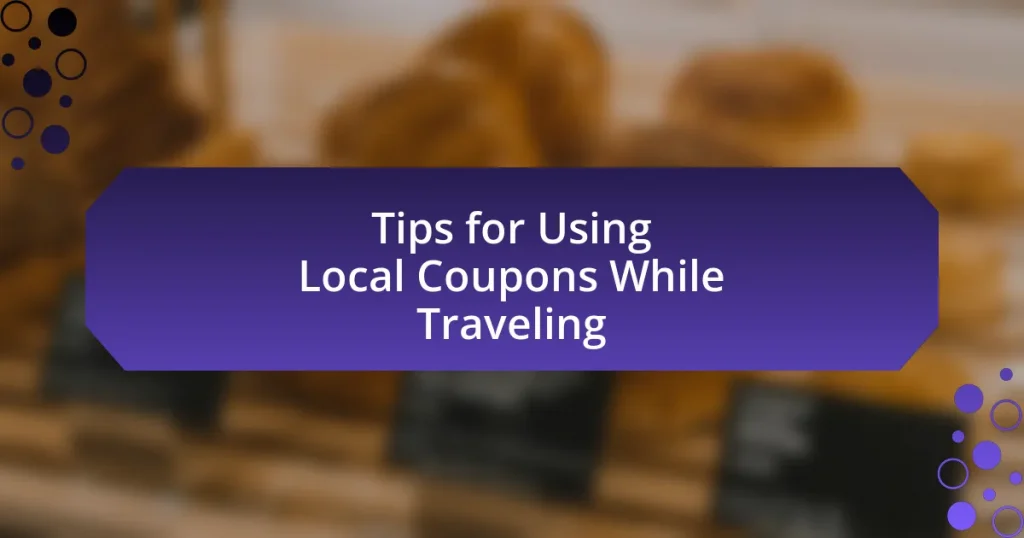Local deal websites are online platforms that provide discounts and promotions for goods and services from local businesses, driving significant growth in the local deals market. These websites connect consumers with merchants through time-sensitive offers, generating revenue via commission-based models. Key features include location-based discounts, user-friendly interfaces, and customer reviews, which enhance trust and engagement. The popularity of these platforms is fueled by consumer demand for localized savings and the convenience of mobile access. However, challenges such as competition and customer trust issues persist, necessitating effective marketing strategies for businesses to maximize their presence and for consumers to navigate potential pitfalls.

What are Local Deal Websites?
Local deal websites are online platforms that offer discounts and promotions for goods and services from local businesses. These websites typically feature deals that are time-sensitive and encourage consumers to purchase vouchers or coupons for experiences such as dining, entertainment, and wellness services. According to a report by Statista, the local deals market has seen significant growth, with millions of users taking advantage of these offers, highlighting their popularity and effectiveness in driving local commerce.
How do Local Deal Websites operate?
Local deal websites operate by connecting consumers with local businesses through discounted offers and promotions. These platforms typically negotiate deals with local merchants, allowing them to offer significant discounts on products or services in exchange for increased customer traffic. For instance, a local restaurant might partner with a deal website to provide a 50% discount on meals, attracting new customers who may not have visited otherwise.
The websites generate revenue by taking a percentage of the sales from the deals sold, which incentivizes them to promote these offers effectively. According to a study by the Harvard Business Review, businesses that engage with local deal websites can see an increase in customer acquisition and retention, validating the operational model of these platforms.
What are the key features of Local Deal Websites?
Local deal websites primarily feature location-based discounts, user-friendly interfaces, and a variety of deals across multiple categories. These platforms allow users to find and purchase deals from local businesses, often including restaurants, services, and entertainment options. The integration of customer reviews and ratings enhances trust and helps users make informed decisions. Additionally, many local deal websites utilize email marketing to notify subscribers of new deals, fostering customer engagement and retention. According to a report by Statista, the local deals market has seen significant growth, indicating the effectiveness of these features in attracting consumers.
How do Local Deal Websites generate revenue?
Local deal websites generate revenue primarily through commission-based models, where they earn a percentage of each sale made through their platform. For instance, when a user purchases a deal, the website retains a portion of the transaction, typically ranging from 20% to 50%, depending on the agreement with the local business. Additionally, these websites may charge businesses for advertising placements or featured listings, further enhancing their revenue streams. According to a report by IBISWorld, the online coupon industry, which includes local deal websites, was valued at approximately $4 billion in 2021, highlighting the financial viability of this business model.
Why have Local Deal Websites gained popularity?
Local deal websites have gained popularity due to their ability to offer significant discounts on products and services, attracting budget-conscious consumers. These platforms provide a convenient way for users to discover local businesses while saving money, which has become increasingly appealing in a competitive market. According to a study by the Local Search Association, 70% of consumers reported using deal websites to find local deals, highlighting their effectiveness in driving foot traffic to businesses. Additionally, the rise of mobile technology has facilitated easy access to these deals, further contributing to their popularity.
What factors contribute to the rise of Local Deal Websites?
The rise of Local Deal Websites is primarily driven by the increasing demand for localized discounts and promotions among consumers. This demand is fueled by the growth of online shopping and the desire for cost-effective options in local markets. Additionally, the proliferation of smartphones and mobile internet access has made it easier for consumers to discover and utilize these deals in real-time. According to a report by Statista, the global online coupon market is projected to reach $92 billion by 2023, indicating a significant trend towards digital savings. Furthermore, businesses benefit from these platforms by gaining exposure to new customers and increasing foot traffic, which further incentivizes their participation in local deal offerings.
How do consumer behaviors influence the success of Local Deal Websites?
Consumer behaviors significantly influence the success of Local Deal Websites by determining the demand for local offers and the frequency of user engagement. When consumers actively seek discounts and local experiences, they drive traffic to these websites, increasing their visibility and sales potential. Research indicates that 80% of consumers are more likely to purchase from a local business if they find a deal online, showcasing the direct correlation between consumer interest in savings and the effectiveness of these platforms. Additionally, consumer preferences for convenience and mobile accessibility further enhance the success of Local Deal Websites, as users increasingly rely on their smartphones to discover and redeem local deals.
What challenges do Local Deal Websites face?
Local deal websites face several challenges, including intense competition, customer trust issues, and the sustainability of business models. The intense competition arises from numerous platforms vying for the same local market, which can lead to price wars and reduced profit margins. Customer trust issues stem from concerns about the quality of deals and the reliability of service providers, as negative experiences can deter repeat business. Additionally, many local deal websites struggle with sustainable business models, as they often rely on heavy discounts that can undermine profitability. According to a study by the Harvard Business Review, nearly 50% of local deal customers do not return for repeat purchases, highlighting the difficulty in retaining customers and ensuring long-term viability.
What are the common pitfalls for Local Deal Websites?
Common pitfalls for local deal websites include poor user experience, lack of merchant engagement, and ineffective marketing strategies. Poor user experience often arises from complicated navigation and slow loading times, which can deter potential customers. Lack of merchant engagement can lead to limited deal offerings, reducing the site’s attractiveness to users. Ineffective marketing strategies, such as not targeting the right audience or failing to utilize social media effectively, can result in low visibility and user acquisition. According to a study by the Local Search Association, 70% of consumers prefer to find local deals online, highlighting the importance of addressing these pitfalls to capture market interest.
How do Local Deal Websites address competition?
Local deal websites address competition by offering unique promotions and localized deals that cater specifically to their target markets. These platforms often collaborate with local businesses to create exclusive offers that cannot be found on larger, national deal sites, thus attracting customers looking for specific savings in their area. For instance, a study by the Local Search Association found that 70% of consumers prefer to shop locally, which local deal websites leverage by providing tailored deals that resonate with community interests. Additionally, these websites utilize user-generated reviews and ratings to build trust and differentiate themselves from competitors, enhancing their appeal to potential customers.

How can businesses leverage Local Deal Websites?
Businesses can leverage Local Deal Websites by offering targeted promotions that attract local customers and increase foot traffic. By creating deals that are specifically designed for their local audience, businesses can enhance visibility and engagement within their community. For instance, a study by the Local Search Association found that 70% of consumers prefer to shop locally when they see deals that appeal to them. This indicates that well-structured promotions on local deal platforms can significantly boost sales and customer loyalty. Additionally, businesses can utilize customer reviews and ratings on these websites to build trust and credibility, further enhancing their appeal to potential customers.
What strategies should businesses adopt when using Local Deal Websites?
Businesses should adopt targeted marketing strategies when using Local Deal Websites to maximize their reach and effectiveness. This includes identifying their target audience and tailoring deals to meet their specific needs, which can lead to higher conversion rates. Additionally, businesses should focus on creating compelling offers that provide real value, as studies show that attractive deals can increase customer engagement by up to 50%.
Furthermore, maintaining a strong online presence and actively engaging with customers through social media can enhance visibility and drive traffic to the deal listings. Research indicates that businesses that respond to customer inquiries and feedback on these platforms see a 30% increase in customer loyalty.
Lastly, analyzing performance metrics from the deal campaigns allows businesses to refine their strategies over time, ensuring that they are effectively reaching their audience and optimizing their offers based on customer preferences.
How can businesses effectively market their deals on these platforms?
Businesses can effectively market their deals on local deal websites by utilizing targeted promotions and engaging content. By analyzing customer demographics and preferences, businesses can tailor their offers to specific audiences, increasing relevance and appeal. For instance, a study by the Local Search Association found that 70% of consumers prefer personalized deals based on their interests. Additionally, incorporating high-quality visuals and clear calls-to-action in marketing materials can enhance engagement, as content with compelling images receives 94% more views. Furthermore, leveraging social media to share deals can amplify reach, as 54% of social media users report discovering new products through these platforms.
What are the best practices for creating appealing offers?
The best practices for creating appealing offers include clearly defining the value proposition, ensuring the offer is time-sensitive, and utilizing attractive visuals. A clear value proposition communicates the benefits and differentiates the offer from competitors, which is crucial for capturing consumer interest. Time-sensitive offers create urgency, encouraging quicker decision-making and increasing conversion rates; for example, limited-time discounts can lead to a 300% increase in sales according to marketing studies. Additionally, using high-quality visuals enhances the perceived value of the offer, as research shows that 65% of people are visual learners, making compelling imagery essential for engagement.
What types of businesses benefit most from Local Deal Websites?
Local deal websites primarily benefit small to medium-sized businesses, particularly in the retail, dining, and service sectors. These businesses often rely on local customer bases and can attract new customers through discounted offers. For instance, restaurants can increase foot traffic during off-peak hours by providing deals, while retail stores can clear inventory and boost sales through promotions. According to a study by the Local Search Association, 70% of consumers reported using local deals to discover new businesses, highlighting the effectiveness of these platforms in driving local engagement and sales.
Which industries see the highest engagement on Local Deal Websites?
The industries that see the highest engagement on Local Deal Websites include restaurants, beauty and wellness services, and entertainment. Restaurants often leverage these platforms to attract customers with discounts, leading to increased foot traffic and sales; for instance, a study by Groupon indicated that 60% of users reported trying a new restaurant through a deal. Beauty and wellness services, such as spas and salons, also benefit significantly, as they frequently offer promotions to entice new clients, resulting in higher booking rates. Additionally, the entertainment industry, including activities like movie theaters and local attractions, engages users by providing deals that encourage attendance, with reports showing that discounted tickets can boost attendance by up to 30%.
How can small businesses maximize their presence on Local Deal Websites?
Small businesses can maximize their presence on Local Deal Websites by optimizing their listings with accurate information, engaging visuals, and compelling offers. Accurate business details, such as address, phone number, and hours of operation, ensure customers can easily find and contact the business. Engaging visuals, including high-quality images and videos, attract more attention and enhance the appeal of the deals offered. Compelling offers, such as discounts or exclusive promotions, encourage potential customers to take action. According to a study by the Local Search Association, 70% of consumers prefer to engage with businesses that provide clear and attractive deals on local platforms, highlighting the importance of effective presentation on these websites.

What should consumers know about Local Deal Websites?
Consumers should know that local deal websites offer significant discounts on products and services from local businesses, often through limited-time offers. These platforms typically require upfront payment for vouchers that can be redeemed later, which can lead to savings of 50% or more compared to regular prices. However, consumers should also be aware of potential limitations, such as expiration dates, restrictions on usage, and the possibility of businesses not honoring deals if they become overwhelmed by demand. According to a study by the Harvard Business School, 50% of consumers who purchase deals from these websites do not redeem them, indicating that while the savings can be appealing, the actual value may vary based on consumer behavior and business practices.
How can consumers find the best deals on Local Deal Websites?
Consumers can find the best deals on Local Deal Websites by utilizing comparison tools and subscribing to deal alerts. Comparison tools allow users to evaluate multiple offers side by side, ensuring they select the most advantageous deal. Subscribing to deal alerts enables consumers to receive notifications about new promotions and discounts tailored to their preferences. Research indicates that consumers who actively engage with these tools can save an average of 30% on local services compared to those who do not.
What tips can help consumers avoid scams on Local Deal Websites?
To avoid scams on local deal websites, consumers should verify the legitimacy of the website and the deals offered. Researching the website’s reputation through reviews and ratings on independent platforms can reveal past consumer experiences. Additionally, consumers should be cautious of deals that seem too good to be true, as these often indicate potential scams. Using secure payment methods, such as credit cards, provides added protection against fraud, as these methods often allow for dispute resolution. Furthermore, consumers should be wary of sellers who pressure them to make quick decisions or provide personal information upfront, as these tactics are commonly used by scammers.
How can consumers evaluate the value of a deal?
Consumers can evaluate the value of a deal by comparing the deal’s price to the regular price of the product or service, assessing the percentage discount offered, and considering the quality and relevance of the offering. For instance, if a local deal website advertises a restaurant meal at 50% off, consumers should check the standard menu prices to confirm the discount’s validity. Additionally, reviews and ratings of the product or service can provide insights into its quality, helping consumers determine if the deal is worth pursuing. Research indicates that consumers often rely on price comparisons and peer reviews to gauge value, reinforcing the importance of these factors in decision-making.
What are the potential drawbacks for consumers using Local Deal Websites?
Consumers using Local Deal Websites may face several potential drawbacks, including limited selection, quality concerns, and expiration dates on deals. Limited selection occurs because these websites often feature a narrow range of businesses, which may not cater to all consumer preferences. Quality concerns arise when consumers purchase deals for services or products that do not meet their expectations, as the deals may attract lower-quality providers. Additionally, many deals come with expiration dates, which can pressure consumers to make quick decisions, potentially leading to regret or dissatisfaction. According to a study by the Harvard Business Review, 20% of consumers reported dissatisfaction with the quality of services received through deal websites, highlighting the risks associated with these platforms.
What should consumers be cautious about when purchasing deals?
Consumers should be cautious about hidden fees and terms when purchasing deals. Many local deal websites advertise significant discounts, but the final price may include additional charges that are not immediately apparent. For instance, a study by the Better Business Bureau found that 60% of consumers reported unexpected fees associated with deals, which can negate the perceived savings. Additionally, consumers should verify the credibility of the businesses offering the deals, as some may not deliver the promised services or products, leading to dissatisfaction and potential financial loss.
How can consumers ensure they are getting quality services or products?
Consumers can ensure they are getting quality services or products by conducting thorough research and reading reviews. Researching involves checking the reputation of the service provider or product manufacturer through reliable sources, such as consumer reports or industry ratings. Reading reviews on platforms like Yelp or Google can provide insights into the experiences of previous customers, helping to gauge the quality of offerings. According to a 2021 survey by BrightLocal, 87% of consumers read online reviews for local businesses, indicating that reviews significantly influence purchasing decisions.
What practical tips can enhance the experience with Local Deal Websites?
To enhance the experience with Local Deal Websites, users should regularly check for new deals and sign up for email alerts. This practice ensures that users stay informed about the latest offers, which can lead to significant savings. Additionally, reading user reviews and ratings helps in assessing the quality of deals and services before making a purchase. Research indicates that consumers who engage with reviews are 63% more likely to make informed buying decisions. Furthermore, utilizing social media platforms to follow local deal websites can provide access to exclusive promotions and discounts. Engaging with these platforms can increase awareness of time-sensitive deals, enhancing the overall shopping experience.



